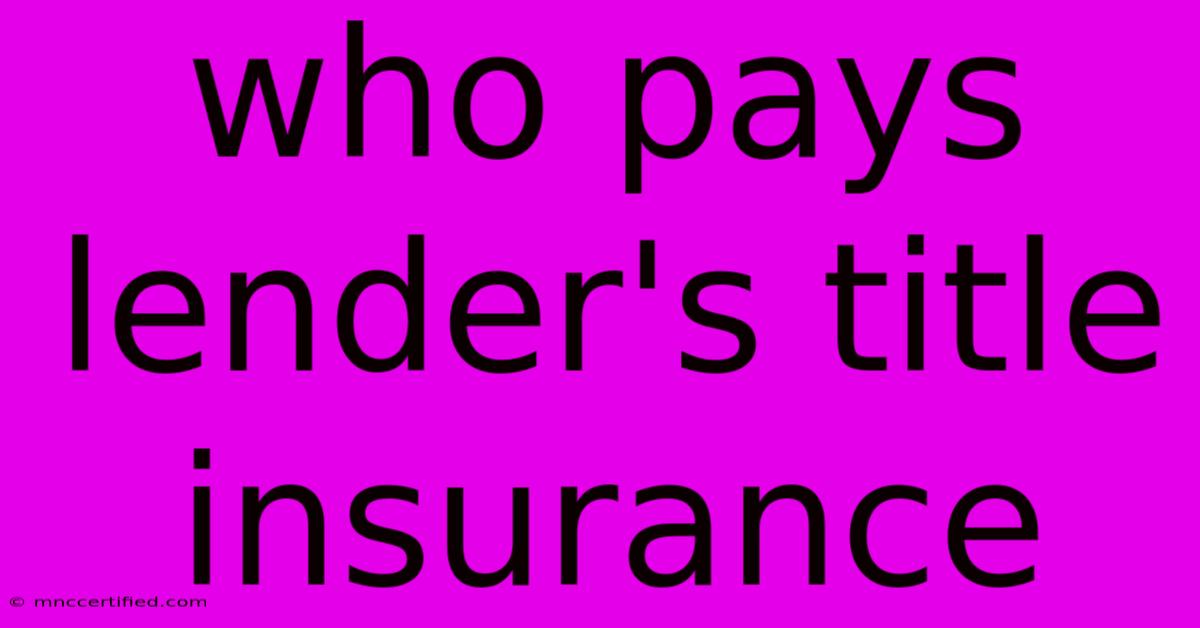Who Pays Lender's Title Insurance

Table of Contents
Who Pays for Lender's Title Insurance? Understanding the Costs of Homebuying
Buying a home is a significant financial undertaking, and understanding all associated costs is crucial. One expense that often causes confusion is lender's title insurance. This post will clarify who pays for lender's title insurance and why it's a necessary part of the mortgage process.
What is Lender's Title Insurance?
Lender's title insurance protects the lender (the bank or mortgage company) against financial loss if problems arise with the home's title after the loan is issued. These problems could include:
- Forged documents: Someone fraudulently claimed ownership of the property.
- Unrecorded liens: Outstanding debts or claims against the property weren't discovered before the loan was made.
- Boundary disputes: Unclear property lines lead to ownership conflicts.
- Errors in public records: Mistakes in official documents affecting the property's title.
Essentially, it safeguards the lender's investment in your property. If a title issue emerges, the insurance company compensates the lender for their losses.
So, Who Pays for Lender's Title Insurance?
The short answer is: the borrower typically pays for lender's title insurance. This cost is usually included in the closing costs, a lump sum paid at the time of closing. It's a one-time fee, and the amount varies depending on the loan amount and the property's location.
Why the borrower pays: The lender requires this insurance to protect their investment. They essentially make it a condition of the loan. While the lender benefits directly from the policy, the cost is passed on to the borrower as part of the overall transaction.
What about Owner's Title Insurance?
It's important to differentiate lender's title insurance from owner's title insurance. Owner's title insurance protects the buyer (the homeowner) against future title defects. Unlike lender's title insurance, which is typically a one-time payment, owner's title insurance provides ongoing protection for as long as the homeowner owns the property. The buyer typically pays for owner's title insurance as well. However, understanding this distinction is key, as some confuse the two.
Negotiating Closing Costs: Can You Reduce Lender's Title Insurance?
While you can't completely avoid paying for lender's title insurance, you can shop around for the best rates. Different title companies offer varying prices. Getting multiple quotes from different title insurance companies is a smart strategy. This allows you to compare costs and find the most competitive option. Your real estate agent or mortgage broker can often assist in this process.
Remember, transparency is key. Carefully review all closing costs before signing any documents. Don't hesitate to ask questions if anything is unclear.
Key Takeaways:
- Lender's title insurance protects the lender.
- The borrower typically pays for lender's title insurance at closing.
- It's a one-time fee included in closing costs.
- Shop around for competitive rates from different title insurance companies.
- Understand the difference between lender's and owner's title insurance.
By understanding who pays for lender's title insurance and its importance, you can navigate the homebuying process with greater confidence and clarity. Remember, proactive research and informed decision-making are key to a smooth and successful home purchase.

Thank you for visiting our website wich cover about Who Pays Lender's Title Insurance. We hope the information provided has been useful to you. Feel free to contact us if you have any questions or need further assistance. See you next time and dont miss to bookmark.
Featured Posts
-
Itvs I M A Celeb 2024 Jane Moore
Nov 18, 2024
-
Kittle Misses Seahawks Game Injury Update
Nov 18, 2024
-
I M A Celeb Dean Dark Past Details
Nov 18, 2024
-
Patriots Lose Close Game To Rams
Nov 18, 2024
-
Jones Rooney Enjoy Night Out
Nov 18, 2024